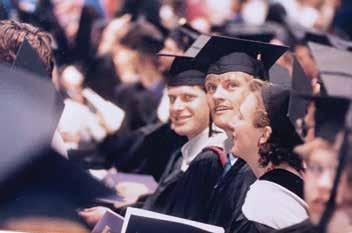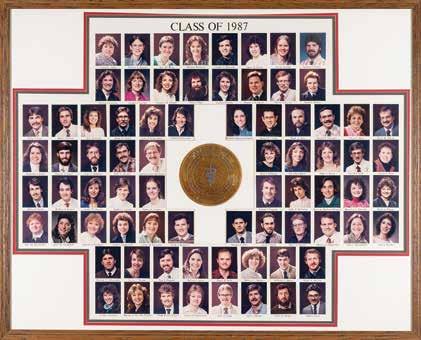
6 minute read
DVM Badger Den
Classmates Band Together to Support Students of Today and Tomorrow
Bradley Poff DVM’87 couldn’t be more excited. After approaching UW School of Veterinary Medicine (SVM) administration in early January about creating a class gift, just a few short months later, he and his peers successfully established the SVM Charter Class of 1987 Scholarship Fund.
Advertisement
Nearly 34 years had passed since graduation when Poff emailed his fellow alumni last winter with an idea for a class scholarship. “We made an impact as a group when we entered the new School of Veterinary Medicine in 1983 and we could come full circle if we could, again, make an impact as a class,” he wrote.
For many, it had been decades since they had heard from their classmate. To Poff’s surprise and delight, an avalanche of messages, curiosity, and banter followed, with responses ranging from “I’m in!” to “Great idea!” to “Let’s do it!”
Poff took the lead in spearheading the effort and worked with the school’s Office for Advancement on process details. On their first day of fundraising, alumni contributed $11,000. Within days, the class reached and then exceeded the goal amount needed to endow the scholarship fund.
Yet, even though the fundraising came together quickly, the impetus was years in the making. Since retiring, Poff has had time to proverbially count his blessings. His recollections on his unusual and immensely satisfying career — beginning with his earliest years as a biology grad from UW-Eau Claire, through to the founding days of his medical device company — gave him insight into some of the persistent obstacles to education. His experiences also fueled his desire to rally classmates to help SVM applicants and students, now and for years to come.
Poff attributes his acceptance to and graduation from the School of Veterinary Medicine to a string of small yet significant chance moments and the help of caring people along the way. For example, a casual conversation with a neighborhood friend led to his first post-college job. After this friend was accepted into medical school, he offered Poff his old job at Sacred Heart Hospital in Eau Claire. Soon, Poff was hired as a hospital orderly and operating room tech-
nician, scrubbing in to assist in soft tissue and orthopedic surgery. The experience forever changed his outlook. Fast forward a few years and one child later and Poff’s can-do attitude and eagerness to learn landed him a role as a project supervisor with the Wisconsin National Primate Research Center in Madison. Two years into that position and with a second child on the way, Poff was asked a life-changing question. Hideo Uno, then a senior scientist and division head at the center, asked Poff, “What did you want to do when you started school? You can’t keep doing this forever.” Poff answered that he always wanted to be a veterinarian. To that, Uno suggested Poff contact Sue Hyland, as he had heard that she and others were working to establish a veterinary school in Wisconsin. Poff followed through and had an earnest conversation with Hyland about what it would take to apply for a Poff as a School of Veterinary Medicine student in the 1980s. position in the school’s charter class. Uno supported this newfound quest, supplying Poff with a calculator and text-

The UW School of Veterinary Medicine Class of 1987. The class hopes their collective effort to endow the Charter Class of 1987 Scholarship Fund might inspire other alumni to establish their own class scholarship funds.
The UW School of Veterinary Medicine Class of 1987. The class hopes their collective effort to endow the Charter Class of 1987 Scholarship Fund might inspire other alumni to establish their own class scholarship funds.
books for his prerequisite classes. Uno also kept Poff on salary at the primate center with a flexible schedule so he could take classes during the day and focus on lab work in the evenings and on weekends.
Poff’s tenacity with coursework led to his acceptance into the newly established UW School of Veterinary Medicine. While hugely gratifying, hurdles still existed.
At age 28 and with a young family, Poff needed to find employment during his four years as a veterinary medical student to earn income and qualify for health insurance. So, he wrote to all the SVM department chairs, asking if he could work in their labs concurrent with attendance. In response, endocrinologist Mark Brownfield offered him a research position.
As a DVM student, Poff often thought, “How in the world am I ever going to pay for this?” He took solace in founding Dean Barney Easterday’s reassuring words: “You’re going to get through the program, both financially and academically, I’m sure.”
“Dean Easterday, Sue Hyland, and the core founders group really had the forethought to think of the students,” Poff recalls. Through scholarships and employment, Poff graduated with $32,000 in debt — “a good return on investment I think!”
Poff sees this scholarship effort as an opportunity to recognize striving students and the school’s legacy of caring. To date, 43 gifts have been received, mostly from Class of 1987 alumni, totaling $43,050 to endow the School of Veterinary Medicine Charter Class of 1987 Scholarship Fund, which will provide student support in perpetuity. If you’d like to make a donation, visit supportuw.org/giveto/SVM87.
Denise Garlow
A Message to DVM Alumni
Take Care Of Yourself
As our story on the school’s wellbeing efforts (pages 14-15) highlighted, taking care of yourself can mean many different things. I am proud to be affiliated with a profession paying close attention to this topic and providing resources that help us understand the numerous components of wellbeing and how we — as individuals and a school — can promote positive wellbeing.
I don’t know about you, but because of the pandemic, I’ve learned a lot about myself and what supports my wellbeing. Being forced to slow down (or stop) non-work activities, stay home, and interact with people in new ways has given me insights into what is most important personally and helps me stay fulfilled. I’ve been thinking about what I want my “new normal” to look like and how I can keep in place new habits I formed (like daily walking or running) that greatly improve my mental health. And how I can make things I’ve really missed (like inperson visits with friends) a priority as activities begin to fill up my calendar again. Importantly, I’ve learned that good wellbeing shouldn’t be accidental — it needs to be deliberate.
For many of you, the pandemic brought significant stress — whether you’ve been on the public health front lines or responding to the increased demand for veterinary medical services done via curbside. Non-work stresses have been incredibly high as well. Alongside these pressures, I hope you’ve been able to explore what is essential to your wellbeing and make taking care of yourself a priority.
And I hope the School of Veterinary Medicine can be helpful with your efforts. As we move forward with our wellbeing work, I will look for ways to include alumni in our efforts and the resources we offer. I recognize that in many ways, the work in this area is just beginning and we have much more to do. But I believe that together we can help one another take care of ourselves.
Be well,
Kristi V. Thorson
Associate Dean for Advancement and Administration







